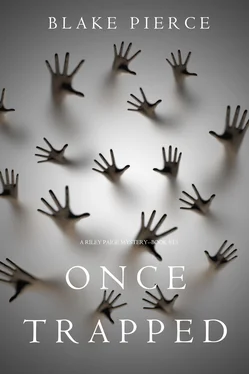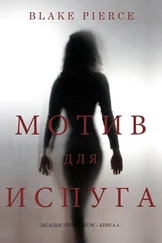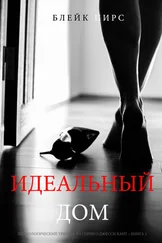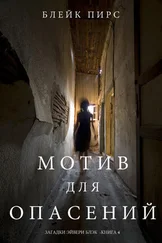Long minutes passed before the cops and the butler returned.
They said they hadn’t found any intruders or any sign that anyone had broken into the house. They’d found the live-in staff asleep in their beds and had no reason to think that any of them were responsible.
The medical examiner and his team arrived and began to attend to the body. The huge room was really quite crowded now. At long last, the bloodstained woman of the house seemed to be aware of the bustle of activity.
She got up from her chair and said to the butler, “Maurice, where are your manners? Ask these good people if they’d like anything to eat or drink.”
Petrie walked toward her, taking out his handcuffs.
He said to her, “That’s very kind of you, ma’am, but it won’t be necessary.”
Then, in an extremely polite and considerate tone, he began to read Morgan Farrell her rights.
Riley couldn’t help but worry as the court session unfolded.
So far, everything seemed to be going smoothly. Riley herself had testified about the kind of home she was trying to make for Jilly, and Bonnie and Arnold Flaxman had testified to Jilly’s desperate need for a stable family.
Even so, Riley felt uneasy about Jilly’s father, Albert Scarlatti.
She’d never actually seen the man before today. Judging from what Jilly had told her about him, she had pictured a grotesque ogre of a man.
But his actual appearance surprised her.
His once-black hair was heavily streaked with gray, and his dark features were, as she’d expected, ravaged from years of alcoholism. Even so, he seemed perfectly sober right now. He was dressed well but not expensively, and he was kindly and charming with everyone he talked to.
Riley also wondered about the woman sitting at Scarlatti’s side and holding his hand. She, too, looked as though she’d lived a hard life. Otherwise, her expression was difficult for Riley to read.
Who is she? Riley wondered.
All Riley knew about Scarlatti’s wife and Jilly’s mother was that she had disappeared many years ago. Scarlatti had often told Jilly that she’d probably died.
This couldn’t be her after all these years. Jilly had shown no sign of even knowing this woman. So who was she?
Now it was time for Jilly to speak.
Riley squeezed Jilly’s hand reassuringly, and the young teenager took the stand.
Jilly looked small in the big witness chair. Her eyes darted around the courtroom nervously, glancing at the judge, then making eye contact with her father.
The man smiled with what appeared to be sincere affection, but Jilly hastily averted her gaze.
Riley’s attorney, Delbert Kaul, asked Jilly how she felt about the adoption.
Riley could see Jilly’s whole body shake with emotion.
“I want it more than anything I’ve ever wanted in my life,” Jilly said in an unsteady voice. “I’ve been so, so happy living with my mom—”
“You mean Ms. Paige,” Kaul said, gently interrupting.
“Well, she’s my mom now as far as I’m concerned, and that’s what I call her. And her daughter, April, is my big sister. Until I started living with them, I had no idea what it would be like—having a real family to love me and care for me.”
Jilly seemed to be bravely fighting back her tears.
Riley wasn’t sure that she was going to be able to do the same.
Then Kaul asked, “Can you tell the judge a little about what it was like living with your father?”
Jilly looked at her father.
Then she looked at the judge and said, “It was awful.”
She went on to tell the court what she had told Riley yesterday—how her father had locked her in a closet for days. Riley shuddered as she listened to the story all over again. Most of the people in the courtroom seemed to be deeply affected by it. Even her father hung his head.
When she was finished, Jilly was truly in tears.
“Until my new mom came into my life, everyone I loved ended up leaving sooner or later. They couldn’t stand living with Dad because he was so awful to them. My mother, my older brother—even my little puppy, Darby, ran away.”
Riley’s throat tightened. She remembered Jilly crying when she spoke of the puppy she’d lost so many months ago. Jilly still worried about what had become of Darby.
“Please,” she said to the judge. “Please don’t send me back to that. I’m so happy with my new family. Don’t take me away from them.”
Jilly then came back and sat next to Riley again.
Riley squeezed her hand and whispered to her, “You did really well. I’m proud of you.”
Jilly nodded and wiped away her tears.
Then Riley’s attorney, Delbert Kaul, presented the judge with all the necessary papers to finalize the adoption. He was especially emphasizing the consent form signed by Jilly’s father.
As far as Riley could tell, Kaul was doing a reasonably thorough job with the presentation. But his voice and manner were hardly inspiring, and the judge, a beefy, scowling man with small, beady eyes, didn’t seem to be at all impressed.
For a moment, Riley’s mind drifted back to the bizarre phone call she’d gotten yesterday from Morgan Farrell. Of course Riley had contacted the police in Atlanta right away. If what the woman had said was true, then surely she was in custody by now. Riley couldn’t help wondering what had really happened.
Was it really possible that the fragile woman she’d met in Atlanta had committed murder?
This is no time to think about all that, she reminded herself.
When Kaul finished his presentation, Scarlatti’s lawyer stood up.
Jolene Paget was a keen-eyed woman in her thirties whose lips seemed to be shaped in a slight but perpetual smirk.
She said to the lawyer, “My client wishes to contest this adoption.”
The judge nodded and growled, “I know he does, Ms. Paget. Your client had better have a good reason for wanting change his own decision.”
Riley immediately noticed that, unlike her own lawyer, Paget wasn’t referring to any notes. Also unlike Kaul, her voice and demeanor exuded self-confidence.
She said, “Mr. Scarlatti has very good reason, your honor. He gave his consent under duress. He was going through an especially hard time and didn’t have a job. And yes, he was drinking back then. And he was depressed.”
Paget nodded toward Brenda Fitch, who was also sitting in the courtroom, and added, “He was easy prey to pressure from social services personnel, especially this woman. Brenda Fitch threatened to bring him up on charges for entirely made-up crimes and offenses.”
Brenda let out a sharp gasp of outrage. She said to Paget, “That’s not true and you know it.”
Paget’s smirk broadened as she said, “Your honor, would you kindly tell Ms. Fitch not to interrupt?”
“Please keep quiet, Ms. Fitch,” the judge said.
Paget added, “My client also wishes to bring charges of kidnapping against Ms. Paige—with Ms. Fitch as an accessory.”
Brenda let out an audible groan of disgust, but Riley forced herself to keep quiet. She’d known all along that Paget was going to pursue this issue.
The judge said, “Ms. Paget, you’ve presented no evidence of kidnapping by anybody. As for the duress and threats you mentioned, you’ve offered no proof or evidence. You’ve said nothing to persuade me that your client’s initial consent shouldn’t still stand.”
Albert Scarlatti then got to his feet.
“May I say a few words on my own behalf, your honor?” he begged.
When the judge nodded his approval, Riley felt a new jolt of concern.
Scarlatti hung his head and spoke in a low, quiet voice.
“What Jilly told you just now about what I did to her—I know it sounds awful. And Jilly, I’m awfully sorry. But the truth is, that’s not exactly how it happened.”
Читать дальше












